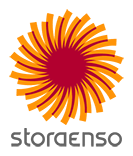Progress continues on a new district heating line connecting the mill to Knielingen, where it will be connected to the existing transport line of Stadtwerke Karlsruhe. Lower in CO₂ emissions and more energy efficient than other means of heating, the joint project at Maxau Mill will be subsidised with approximately 1.3 million Euros in funding from the European Union.
"Our goal is to make Karlsruhe's heat supply even more energy-efficient and independent of fossil fuels," says Dr. Olaf Heil, Technical Director of Stadtwerke Karlsruhe. "Together with Stora Enso, we have achieved another important milestone."
Low-temperature excess heat from the Oberrhein mineral oil refinery (MiRO) has already been fed into the district heating network since 2010. With the new connecting line, the excess heat extracted from the combined heat and power plant at the Maxau Mill will flow into the city's district heat network by the end of 2022.
“Stora Enso has set ambitious science-based targets to reduce its greenhouse gas emissions. At the Maxau Mill, we are proud to be able to contribute to achieving these ambitious goals,” says Joachim Grünewald, Managing Director of Stora Enso Maxau Mill.
The total cost of the investment at Maxau Mill amounts to 2.7 million euros. The connecting line has been supported by EU funds to mitigate the consequences of the pandemic and support economic recovery. The Baden-Württemberg’s 2014 – 2020 ERDF programme specifically supports initiatives related to innovation, energy transition and the reduction of CO₂ emissions.
A further step towards the fossil-free future
The amount of heat provided by Maxau Mill will be around 50,000 MWh annually, enabling a CO₂ reduction of approximately 11,500 tons per year. Calculated on a household-basis, Maxau Mill has the capacity to supply around 5,000 Karlsruhe households with district heating every year.
Industrial surplus heat is especially sustainable because it is sourced from the excess heat from industrial processes and does not have to be produced separately.
With the new connection line from Maxau Mill, the amount of heat produced using natural gas will be reduced in the region, making the Karlsruhe district heating even more sustainable and fossil fuel-free.










